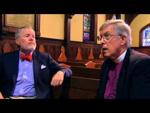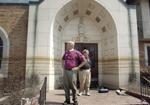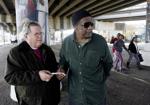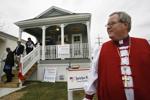The Right Rev. Charles Jenkins, the former Episcopal bishop who was both broken and transformed by the ordeal of Hurricane Katrina and who subsequently retooled the work of his 19,000-member Diocese of Louisiana to remedy the social injustices exposed by the storm, died Friday, the diocese said. Jenkins, who had pancreatic cancer and lived in St. Francisville after retirement, was 69.
A native of north Louisiana cotton country, Jenkins left a boyhood in the Southern Baptist Convention to become an Episcopal priest in several parishes before being elected to shepherd 54 Episcopal churches in southeast Louisiana in 1997. Jenkins, rector of St. Luke’s in Baton Rouge at the time, was consecrated bishop the following year.
The global Anglican Communion was then in an acute phase of an internal struggle over the theology of homosexuality. The tensions threatened to split the U.S. branch from the global communion, even as the U.S. church threatened to unravel internally.
As pressure mounted over several years before and after Hurricane Katrina, Jenkins was among a handful of U.S. bishops who urged national and global unity despite rising calls for schism.
Jenkins was deeply involved in that issue when, seven years into his episcopacy, Hurricane Katrina almost destroyed New Orleans in 2005. Safely evacuated but alone in Baton Rouge, he saw televised images of thousands of suffering New Orleanians, mostly Black people, stranded for the better part of a week at the Ernest N. Morial Convention Center.
The sight of their misery almost broke him, he said later. It compelled Jenkins, a White man in a majority-White church, to face systemic racial and economic inequities that he had seen in New Orleans but not appreciated. As national relief money poured in, Jenkins launched ministries that put the Louisiana diocese into new work such as building houses, running medical clinics and forging new relationships with African American neighborhoods and ministries.
Jenkins said he wanted to institutionalize in his church the “reckless generosity” that prevailed in the first months after the storm. “How do we make sure that this is not an aberration, but becomes part of our identity as Christians, so that we cannot not do this and still claim to be who we are,” he said at the time.
G. Andrew Boyd / The Times-Picayune
He described Katrina as “the death of many things that I took for granted.” After the storm he actively sought the company of Black pastors and community leaders to see the city through their eyes. As New Orleans crafted its hotly contested rebuilding agenda, he supported Black residents who feared they were being deliberately marginalized.
All of it triggered a wrenching personal transformation.
“You have a man [who] was deeply shaken at time of Katrina, to the depths of his soul,” said the Rev. Canon Mark Stevenson, a Jenkins top aide who now works at national church headquarters in New York. “He had to come to grips with his own history, with his own complicity as a White man in a city filled with racism and classism and all sorts of other -isms.’”
Jenkins was a candidate for presiding bishop, head of the U.S. church, in 2006 but was not elected.
In 2007, the Most Rev. Rowan Williams, then the archbishop of Canterbury and head of the Anglican Communion, convened in New Orleans a meeting of Anglican leaders to fashion another in a series of compromises to keep the union from blowing up. Jenkins used the ordeal of New Orleans to display the consequences of poverty and social injustice. And in a series of internal meetings, Jenkins was among a few bishops who fashioned a compromise that staved off schism in the global union.
In time, however, Katrina, the stress of rebuilding and especially the systemic inequities that it laid bare to him ultimately proved disabling to Jenkins. He was diagnosed with depression and worsening post-traumatic stress disorder. He continued working under medical care, but after almost five years of post-storm leadership, announced he would take early retirement at the end of 2009.
The Rev. Jerry Kramer, a hyper-energetic Episcopal priest who transformed a small neighborhood church into a powerhouse that helped drive the …
“I think Charles really understood the Jesus ministry after Katrina. It’s hard. And it can break your heart,” said the Right Rev. Morris Thompson, who succeeded him as bishop.
More than 15 years after the storm, one of the Jenkins ministries born from Katrina, a home-building project called Jericho Road, survives. The others directly linked to the diocese eventually closed as funds dried up, Thompson said.
Jenkins retired to St. Francisville and sought personal solace puttering about outdoors. At times he presided over services at St. John’s, Laurel Hill, the chapel of Grace Church.
Friends who called on him found him more at peace, said Courtney Cowart, a Katrina relief organizer whom Jenkins had recruited. She said Jenkins prayed daily and fished frequently. “We’d go riding in the country on his ATV. He taught me to shoot a Beretta. He was a wonderful raconteur.”
“I hope they remember Charles as a bishop who came terms with his own racism, and desired to understand it and be changed,” Thompson said. “And I hope that would be the goal for all of us White people with privilege, to make a difference.
“We’re still in that conversation. We still struggle with that.”
Jenkins is survived by his wife, Louise; sons Benjamin and Edward; and two granddaughters.
A funeral service is tentatively scheduled May 8 at Grace Church in St. Francisville.

Credit: Source link







